Episode 3
Sharon Bown
Working in East Timor as a Royal Australian Air Force aeromedical evacuation nurse, Sharon narrowly escaped death when the helicopter in which she was travelling crashed in a violent storm. Suffering a severe spinal injury, a shattered jaw and aviation fuel burns, it was the unseen scarring of chronic pain and Post-Traumatic Stress Disorder that threatened to reveal the limits of her resilience. Yet the test was far from over. As Sharon faced the brutal consequences of her service and sacrifice, she endured the loss of her mother to breast cancer, the loss of three friends and colleagues in another helicopter crash and the attempted murder of her policeman father.
Well within her rights to shy away from life, Sharon vowed to not only survive, but to continue to live. To write a new story. She successfully fought against the assumptions of others to continue to serve in the Australian Defence Force – mixing in political circles around the world as Aide-de-Camp to the Minister for Defence, commanding an Air Force health unit, and ultimately proving her capability as a commander in a theatre of war – Afghanistan. Her superpower a decision to rise again pursuing purposeful service over the paralyses of pain.
As a Registered Nurse and humanitarian, Sharon is a woman who embodies grace and compassion, yet the sheer strength and the courage she has displayed over a 16-year military career reflects that of a warrior. Sharon has witnessed the very best and possibly the greatest evil of humanity.
Today Sharon continues to be of service to the men, women and families who serve Australia, providing a valuable insight into the sacrifice and unique qualities of their lives in the service of others. As a Member of the Council of the Australian War Memorial, she provides a voice for all who have served. Having recently completed a Bachelor of Psychological Science, Sharon matches her personal experience with theoretical insight, delving into the nature of survival, resilience, courage, leadership and the art of curating a story of influence that is hopeful, optimistic and unashamedly breaking the taboos of what it is to live life after war.
As a speaker, Sharon is a beacon of hope for those facing adverse circumstances. She is an inspiring leader who balances grace with grit, and dignity with daring. Sharon is a compelling storyteller who will leave the audience spellbound as they journey through the life of a woman who simply wanted to be of service but in doing so would choose a different story and rise to be a courageous and on purpose leader.
Speaker 1: I'm Steve price. I'm proud to be an Australian ambassador for wounded heroes, the first responders to our homeless and at risk veterans providing emergency solutions right across Australia. They're starting to sell furniture and they're starting to sell engagement rings. They're Hawking their metals. They're Hawking the PlayStations for their kids to keep a roof over their head. Every day, year round wounded heroes provides these emergency solutions with no government funding. We just noticed there was a need for that immediacy of crisis funds, immediacy of being able to operate within one hour, 10 minutes, 15 minutes to get food on the table with Tricity to get some rent pays. They're not being evicted. And they saved my life, man. And they work tirelessly seven days a week without any help. No they're running on the smell of an oily rag and then they get there on the farm heroes.
Speaker 1: Well, I had the pleasure during my radio career to interview some extremely bright people. Now Turia Pitt comes to mind the Australian ultra marathon runner, who nearly died when she was caught, of course, in a Bush fire while competing. Now she survived and she's gone on to have two gorgeous children. And coincidentally, she's back on the cover this month of the Australian women's weekly. I mean, she's articulate and she's inspiring. And most of us would probably have killed up in a ball I reckon, and retreated from public life, but not to Rhea, but our guests today on veteran of the day in this series for wounded heroes strikes me of being a person of a similar category. She just pinned an incredible book. One woman's war. I was alerted to that when the current veteran affairs minister Darren Chester tweeted that he'd read that book while he was in isolation. Uh, now Sharon bound, welcome to veteran of the day. What one word would you use to describe yourself?
Speaker 2: Um, yeah, I've never been asked that before. Steve, thank you for having me on to describe myself, probably the chairman. I think it's my determination or my stubbornness that has got me to where I am today.
Speaker 1: We have an incredible story, but let's start right at the beginning. Why the defense force, why did you decide to, to join the military of the defense force in the first place?
Speaker 2: I was already a registered nurse. I was working at Hobart and had been registered for three years. Um, when I decided that I wanted to, um, well it was quite a naive notion that I now had the skills and knowledge and experience to go out and save the world one person at a time. It's a wonderful, uh, naive notion that I often look back on and smile. And I started to research the ways in which I could do that. So I wanted to deliver humanitarian aid overseas. So I wanted to care for people less fortunate than those that I was currently caring for in the private health care system in Australia. And I examined the red cross and the Australian defense force, and eventually settled on applying to join the Royal Australian air force, which provided an aeromedical evacuation capability, which enabled us to deliver healthcare rapidly in areas of need across the world.
Speaker 3: So there's actually a category within the, the RAF, uh, for an aeromedical nurse. Is that, that was the position that you aimed yourself for. You want it to be an aeromedical nurse. You wanted to be at the sharp end of operations.
Speaker 2: Absolutely. But, um, all, uh, clinical staff, certainly doctors, nurses, and medics in the Royal Australian air force are trained in AME. That is the clinical specialty of the Royal Australian air force. Um, health service is that aeromedical evacuation capability. So eventually I was trained to do that, which is exactly what I had set out to do.
Speaker 3: And how, how tough and difficult was the training to get to a point where you were qualified to actually go out on operations?
Speaker 2: I think when you're young and fit, it's not that difficult at all. Looking back on it now, would I pass today? Probably not. I think the excitement, the motivation, the absolute drive to be able to deliver this level of care made the training enjoyable. Certainly it was difficult physically demanding, um, uh, academically demanding as well in many of our courses, but the end results, the skill and knowledge that it provided was exactly what I was thinking. It was something that I had set out to achieve, and therefore I loved the training aspect of it.
Speaker 3: The reactions from people who are, um, uh, wounded in conflict when help arrives the look in their eyes and, and the feeling of gratitude must be something that is so heartwarming for someone like yourself. Who's a nurse and all nurses that I've ever spoken to a great carers that they love to care for people. I mean that gratitude of, Oh, someone's here to help me must be extraordinary to experience.
Speaker 2: Yes. Um, and whenever people ask me, you know, how can you do what you do as a nurse? Um, it's an incredible privilege to be able to be there for people in their greatest time of need to have the skills, the knowledge, the expertise, to be able to make a difference in the life of another person, right at that very moment that they need it. Um, that is an incredible honor and a privilege. And we see that right now in the midst of the COVID pandemic of healthcare, which is around the world, applying their knowledge, their skills, their expertise, to be able to make a difference, not just to individuals, families, communities, and in this case to the entire human population,
Speaker 3: I presume when a young Sharon bound signed up, you never thought that you would be the one that was going to need a emergency medical evacuation, but in East Timor one day in the middle of a dreadful storm, that's exactly what happened, didn't it?
Speaker 2: Yes. Um, you sign up with the knowledge that you're going to be engaged in some high risk activities, whether it's youth naivety and arrogance, I don't know. You'd never believe that it's going to happen to you. And so my goal was to go out and to save other people, not to ever be the one in need of being changed, but yes, on the 2nd of June, 2004 in East Timor, as I set out on an air medical evacuation mission to provide outstanding care to a local woman, I became the casualty that instead was the one requiring lifesaving care.
Speaker 3: So you're strapped into a chopper, uh, 2004 East Timor. And I've never been to East Timor, but I've been to obviously parts of Indonesia. I mean, uh, tropical storms and, and pretty rough ground is something that you would experience. When did you realize you're in trouble?
Speaker 2: Not until late April. So, uh, we're flying through, um, a very intense storm. I was very aware that the air crew were having to work incredibly hard to maintain control of the helicopter and to locate a suitable place for landing. So it wasn't oblivious to the fact that we were in a challenging situation at that point. No, I was not scared. I had complete faith in the air crew that they knew what they were doing. I had worked with them for some months, um, and that we would simply find somewhere to land and get to our patient. That was our aim. That was our focus. I had some concern that they might turn back and that we wouldn't get to her that day. We would have to perhaps try and retrieve via road, which was not going to be easy. So I had concerns for my patient, but not for myself.
Speaker 2: It was when, um, the Mayday call was put out by one of the pilots and the rescue Crimmon was shouting through the Intercom Bryce, Bryce, Bryce, which is the, what is yo to prepare for impact. That's when I knew that this was not doing it in the way that I had thought, in fact, I, and that was when I was overwhelmed by that sense of incredible fear and helplessness, they sitting in the back of the helicopter, you have no control over what is happening to this vehicle. Somebody else's in control and certainly working hard. Um, but it was at that time that I thought I'm either about to die or I'm about to be seriously injured, seriously broken. And I had a few moments there almost of peace to, to think about my family, um, and to think about my loved one and to say goodbye, but also to feel almost really, really sad that I was about to hurt them. You know, I never wanted to do
Speaker 3: Sounds to me like you'd pretty much convinced yourself mentally that you are going to die.
Speaker 2: Yes. I think I prepared my self for that, that outcome. Yeah.
Speaker 3: You abrased, um, did shut your eyes.
Speaker 2: No, I don't think so. No, I don't remember impact. I mean, I suffered a fairly serious head injuries. I don't remember the impact. Um, my last vision was of looking through the windscreen as I, as I bent over to brace and seeing the trees, um, getting closer. So the heavy rain on the windscreen, the windscreen wipers, um, and the fact that we were flying toward the ground or flying to the trees, but that's the last vision. I remember interestingly, when I came to, um, after the impact, I had no vision and it took me a while to figure that out. I, um, I couldn't see anything. It was incredibly dark and it took me some hours, maybe even days to realize that at that point I had my sun visor down on my helicopter, my helmet, sorry, at the sunglasses down on my helmet. Um, and we're now on the ground, one side of the helicopter, um, uh, facing down to the window facing down. So there wasn't a lot of light inside and that's what was interesting. My vision. Not anything else. Yes.
Speaker 3: How long were you unconscious for the year? Do you know? Did anyone tell you?
Speaker 2: No. And I don't think anyone really knows, um, a short period, but not an extended period. Um, I was obviously knocked unconscious with the force of the impact, and then it would have been moments minutes at most that I was unconscious.
Speaker 3: When you woke up, what was, what was happening around you? I mean, we know that you've suffered a serious spinal injury. Uh, you broke your jaw or shattered your jaw and you also got burnt. So the, there must have been was, was the helicopter on fire?
Speaker 2: No, no. The burns I sustained were from being soaked in aviation field. So it was a chemical burn. Yes. Yes. So the first thing, um, as I came to hearing the voice of the doctor who was trying to assist me to get out of the helicopter, realizing that the engine was still running, which in your training is not a good thing. Um, your training is to get as far away from that crashed vehicle as possible because there is aviation fuel, the engine is still running. So this is, um, a great risk of a fire and then becoming aware of the intense physical pain. So, um, just taking in all of those sounds and smells initially, and then realizing that my body wasn't working so that I needed to get out of there almost instinctively knowing I needed to get out of there. But then having this realization that my body wouldn't do what I wanted it to do. So I had this incredible pain in my lower back and my left leg didn't seem to be there. I mean, I knew it was there, but it wasn't responding to me. It wasn't moving when I needed it to. So that then that realization of the fact that I was injured, not really at that point, comprehending what my injuries were, but that I was in an immense amount of pain.
Speaker 3: The back pain overrode the pain that you must've been suffering from, the shattered Juul.
Speaker 2: Yes. Um, it wasn't until I was sitting up on top of the helicopter, I think on my way out that I realized that my mole is we're sitting in the center of my mouth so that my, my Joel was broken. Um, and it w there wasn't a time in module, and that's an indication of how severe the pain in my back was. Obviously they was tiny, my jaw was broken or places. It was quite severely broken, but I couldn't feel it. Um, and that's because of the overriding sensation of pain that was coming from my, um, my fractured vertebra.
Speaker 3: So they get, I mean, we see, uh, people who are playing top level professional sport and they go down and everybody's treated extremely cautiously about back injury. How did they get you from strapped in the seat? You say there, you were sitting on top of the helicopter. They just had to get you out. I presume, regardless of what your back injury might or might not have been.
Speaker 2: Yeah. So the doctor, um, assisted me to undo my seatbelt or lap sash seatbelt, and was telling me that we needed to get out. So he climbed up up to the top of the helicopter you're ahead of me. I then find up the seats as best I could. And I was sitting on top of the helicopter, still trying to come to terms with what had happened, you know, surveying the environment, feeling this incredible pain, wishing that this wasn't happening to me. Um, and looking down and thinking the ground is a long way away. I don't know how I'm going to get down there. Um, and then feeling this hand in my back, and it was actually the doctor pushing me, um, from the top of the helicopter, because really the greatest risk was not damaging my spinal fracture any further. The greatest risks is spot that, getting us away from that aircraft as creepy as possible, and then, um, landing in the mud because it was still raining, the landing face, just incredible pine wrecking my body and still this disbelief of what was happening. I don't want to be here. This can't be happening to me. I'm so still this incredible disbelief. And then, um, the doctor helped me stand and we walked towards what I now know. It was the village of family and him assisting me to lay down and rest so that he could then go back and assist the rest of the three.
Speaker 2: Yes, yes, my right leg, my right leg was fine. My left leg, um, was very weak and exactly by the decline, but yes, again, that adrenaline rush that instinct to get away from the helicopter. Um, yeah, when I look back clinically scenario, that was not the best treatment of my spinal friction, but it was the only treatment that this month was to get away from that house,
Speaker 3: Talking to Sharon Brown. What shape would the other crew in?
Speaker 2: Uh, well, the doctor and, um, the two pilots were fine. I managed to walk away from the crash. I think they had to cut some scratches and bruises, minor injuries. Um, but the rescue Kramer who was on board with us was severely injured and he had shattered his pelvis. And one of the great traumas for me of being at the crash site was watching him fight for his life. Um, I was fairly confident that I was simply broken, um, and that I would be okay, but I wasn't that confident that he would just survive his injuries. So there were two of us that was pretty clean. Yes, he did. And he flies to Florida. He's an amazing individual. And, you know, we have an incredible friendship and an incredible bond that, um, uh, that we shared that experience together and that we have continued to live our lives beyond that incident. Despite what happened to us on that day,
Speaker 3: We're chatting to Sharon Brown and obviously we're raising fund says, as we go through for wounded heroes, I talked to a lot of veterans Sharon about, uh, the effects of PTSD. Um, and I mentioned to reappeared at the beginning. I mean, she has had a remarkable, uh, comeback from the injuries that she got. How did you cope with the recovery and the rehab?
Speaker 2: I was determined to recover. So as a clinician, once I understood the full extent of my injuries, the next logical step for me was understanding how I rehabilitated. Okay. I understand what's happened to me. What does that mean? How do I fix it? Um, and with the clinical injuries that was easy, the chemical burns, healed Juul was fixed with surgery, with plates and screws. My spinal fracture would never be fixed. So it was about how do I rehabilitate my body to now live with this disability? There's this change in my, in my function. Um, and even that had a plan, what crept up on me and what I resisted most of all was the diagnosis of posttraumatic stress, because it was something that I didn't understand. It was a label that I didn't want to be given. Um, I was very aware of the mental health stigma in Australia and in the Australian defense force at that time, which is in 2004. And I myself shared some of it. I felt that the reason I didn't want that diagnosis was that it would make me wait, that it would prove that I was not strong enough to have endured and survived and recovered to the full extent. So it was a diagnosis that I fought very hard again.
Speaker 3: So did you think people would look less or less at you if, if you were to admit that, did you think people would think less of you?
Speaker 2: Yes, absolutely. Absolutely. I knew they would. It wasn't just that I thought they would. I knew they would. Um, and I thought less of myself and that's perhaps the most important thing is it's not necessarily about what other people think. Um, I often say what other people think of me is none of my business, but when it's what you think of yourself, um, I think that's when it's most damaging believing that I was somehow that, um, I was less of a person because I hadn't been, I had been to, uh, psychologically endure and overcome this incredible trauma. That was what was most damaging. It was my acceptance of the diagnosis, my working through my own stigma around mental health, both as an individual and as a nurse was crucial to my ability to recover from PTSD.
Speaker 3: How did this, uh, this mental beating up of yourself, if y'all can put it that way, manifest itself, what did, how did it change you as a human
Speaker 2: Denial? Um, it was denial. And so it was refusing to seek help. It was refusing to admit that I had a problem, um, remaining frightened of the trauma. So remaining triggered by certain events in my life, um, which made it difficult to really recover, uh, unless, and I learned when I started to learn that my or frame my posttraumatic stress, if you like as a rational, um, reaction to a completely irrational situation, but I began to accept it. So I began to accept that. Of course, you're afraid of flying. You have a lived experience of what happens when an aircraft fashion or you're afraid of pain. So you're going to avoid pain because you have that loose memory of intense physical pain. Um, and you're, I was afraid to see it. I never wanted to be in a situation where I was that fearful again.
Speaker 2: And that was because I knew how difficult that was. So every cell in my body, not just my psychology, um, was preventing me or attempting to prevent me from putting myself in a situation that would lead to those outcomes. So if I heard a helicopter, my heart would rise and I would, I would become fearful. Um, if I felt any sort of threat at all, it made me nervous and uneasy and defensive. So beginning to understand that psychological process on that level made it easier for me to exist and made it easier. If you need to begin to seek help and understand how I could treat the manifestations as much.
Speaker 3: It strikes me that the easy way out of this, but it would have been ultimately probably a negative way to go. The easy way out would have been to, to walk away from your military career and maybe take a compensation payment and go and do something else. But you decided not to do that.
Speaker 2: No, I loved my job. Um, you know, that day, um, of the helicopter crash, I was only 29 years old. I lost my health and fitness in a moment. It was gone. Uh, I was
Speaker 3: Distinctly you didn't blame anyone for that?
Speaker 2: No, no. And I don't blame anyone for that. Um, I made a choice. I chose to become a nurse. I chose to join the air force I chose to deploy, um, to team or that second time I had already done a team or deployment. Uh, I didn't need to go back the second time I volunteered to go back. I chose to get on that helicopter that day. And that choice was made because there was somebody in Nate that I wanted to go and assist as a result of all of those choices. I suffered the consequences of the risks that come with those. Uh, and even if I did blame somebody, somebody made a mistake that put me in the situation that I was in blaming them and having that resentment or holding that grudge doesn't change where I am today. If anything, it just, it holds me back. I can't go back into my, I can't undo any of those choices of my own or of anyone else. Um, so I don't dwell on that. I accept what has happened. I wish it hadn't happened. Um, but I can't undo that. I can only influence what I'm doing today and what I continue to do into the future.
Speaker 3: I know everyone's different and every case is different. But anyone listening to this podcast who has, or is going through PTSD from your personal point of view, was there a point when you realized I can get through this, I can survive. I can go back to being a normal functioning person.
Speaker 2: Yes. When I realized that there are effective treatments for PTSD, that gave me hope. So when I was first diagnosed with PTSD, um, I took the same approach to my diagnosis as I had with my physical injuries. And I said to the psychiatrist, okay, I don't want this diagnosis. I don't truly accept it. How do I treat it? And his response sadly, was there is no treatment you're going to have to learn to live with it. And that was really difficult for me to accept. And in fact, I refuse to accept it. I refuse to accept that, um, I could not improve my health and wellbeing. Um, and for, I sought out support from a psychologist in Townsville, um, who was using a treatment called AMDR, which is quite bizarre when you first do it, it's an eye movement, desensitization treatment. Um, and, but also her faith in her treatment and in my ability to recover,
Speaker 3: You hang it yourself over to that person. Really didn't you? I mean, it sounds to me like you trusted that person.
Speaker 2: Yes. And often that is, that is the most difficult thing to do to admit that I need help to ask for that help and then to go along and receive that treatment because treatment is not necessarily pleasant. You know, when we have a bad experience, we don't voluntarily say, I want to talk about that or relive that time and time again, we naturally try to avoid it, but treatment involves confronting that trauma confronting the effects that it has had on us and in that confrontation resolving that trauma. So I now, um, am an ambassador for Phoenix Australia. So there are there the Australian national center of excellence for posttraumatic mental health. Um, and they're, um, branding, you know, Phoenix, Australia, understanding trauma and renewing lives. And I really believe in that there is evidence based treatment for PTSD, but we have to support people to acknowledge that, to come forward, to get help, and to commit themselves, to treat
Speaker 3: Doing enough as a country, as a nation, to realize that there are a lot of people out there who have served their country and do have PTSD and refusing to accept it. Are we doing to reach out to those people? Do you think
Speaker 2: We're improving, we're getting better. Um, and we continue to ask questions about how do we improve. And so I think, um, is that enough? I think we're doing the best that we can with what we have. I think the current global pandemic shines a lot on some of those areas where we really need to, uh, improve where people start to understand what trauma is, um, and the effect that it has on us. And so that, that greater awareness of, of mental health, um, but also of mental health treatment. So are we doing enough, perhaps not, can we do more? Of course we can always do more, but we have to keep asking the question. We have to keep seeking to understand so that we can provide the best treatment and not just treatment, but support. So supporting people to acknowledge that they need to reach out for that help and to engage fully in that treatment.
Speaker 3: Yeah. I've often told this story. I had an uncle who served two different stints in world war two, one in the middle East, one in new Guinea came back and spent the rest of his, his young life in and out of, uh, mental health facilities was an alcoholic and ended up dying alone. You know, house had burned down around him. And when we all asked what was wrong with uncle Don, everyone used to say, well, he's got Canon fever or some silly term that they used to apply to it. At least we'd doing a bit better than we were doing back then.
Speaker 2: Yeah. Yeah. And when I say that we can, we can recover. Um, some of that is learning to live with it. It's, it's not erasing the memories. It's no racing the trauma it's, um, it's learning about how that trauma has affected us and how we, uh, live with that in a functional way, not a dysfunctional way. And there are ways of doing that. And when I talk about people being supported to receive that treatment and the more to engage with that treatment, if you're a single parent, um, he's holding down a job and looking after children going to affect colleges and reliving that trauma and engaging in treatment might make it difficult for you to continue with those other activities in your, in your daily life, those responsibility. And often people will make a choice, particularly parents, particularly people who need to keep providing an income, um, is that, uh, can't afford the time and or the energy or space to go through treatment at the moment, there are higher priorities in my life. So we need to look after each other, as community to enable people to be able to access to
Speaker 3: Sharon. I should point out as written the book one woman's war. She also does a lot of work as a speaker. We'll make sure at the end of this podcast, we let you know, even in this covert time where you can contact Sharon, um, in your book, you also talk about three other incidents that have obviously played strongly into, uh, your mental wellbeing. You lost your mum to breast cancer. Uh, three other of your friends died in a helicopter crash. That must have been dreadful. When you found out about that and your dad who was a police officer, someone actually tried to kill him. I mean, tell us about those, the influence, those three things head on, on your life.
Speaker 2: Yeah, so I had, um, uh, and unusual series of trauma. Um, so with my very direct approach of, let me understand this, let me fix this and then move towards the end scape. Um, the world seemed to keep knocking me back down on my ass. Again, every time I thought I had the answer and the plan, uh, something else would happen. And so that really compounded my trauma. It really compounded my, uh, passive vigilance, right? If you, like, I got to a point where I was waiting, what is going to happen next after you think, um, dividing a helicopter crashes is, is an amazing achievement and you don't think anything could possibly happen as it could be any worse than that. And then, you know, my crash was the 2nd of June, 2004. My mother died in late February of 2005. So, you know, within a very short period of time, I had lost that person in my life.
Speaker 2: That was my central reference point. The person that I would go to, to, to be able to survive these major life events, she was no longer there. Um, and she had been a great inspiration in my recovery, as well as I knew how unwell she was. Um, and I knew how damaging, um, the stress of worry about me was for her. So I was working hard to rehabilitate to demonstrate to her that I was okay, that I was going to be okay, that she didn't need to worry. Um, and then to have lost and to not to have been able to care for her physically as a nurse, as I had always intended to was devastating. The being able to get up and continue on with my own rehabilitation was grieving for my mother, um, was difficult. And in whilst doing that, um, so that was February on the 2nd of April, 2005, you seeking crash in nail in NASA, took the lots of Australian defense force personnel, three of whom were my friends. Um, again, absolutely devastating. Um,
Speaker 3: Can you remember how you felt the moment you, someone rang and told you about that?
Speaker 2: I remember standing in my father's kitchen, um, with the sign to my ear and hearing the news and simply sliding down onto the floor as if his reacts of energy had gone from that. That was it that, you know, this was a significant blow, this complete disbelief. Um, why, why couldn't I protect them? Um, why had they been taken and not me so many questions and just this immense sense of loss overwhelming sorrow was that they will not coming home. Um, and then, you know, the final conversation that I had had with them, with Sergeant Wendy, John, um, before she had deployed all of those things, how quickly, um, life had changed yet again, and where could I find the energy and the stamina to get back up again and to continue on?
Speaker 3: Well, I asked you at the start, what the one would describe yourself would be resilience would be one of them. Um, tell me about your dad. He was a police officer.
Speaker 2: Yes. Dad was a police officer in Tasmania for 13 years. Um, I had, um, rehabilitated to a point where I was deployable again. I had been to Bali after the second Valley bombing and I was now working as I do to the minister for defense, dr. Brendan Nelson in Canberra. And I got a phone call and I think it was from the acting commissioner of police in Tasmania to say that my father had been involved in an incident who'd been shot on duty and he was in hospital. Um, and so again, it was that, um, shock of another incredible trauma, this fear that might get my father was fighting for his life. He'd been shot, uh, once in a fight in the back. And as a nurse saying to the Cola, he counted survive that you can't be shot in the face and shot twice in the back.
Speaker 2: And Oh, yes, he is fine. He's in the hospital. He talking like, Hey, can I talk to you? No, you can't talk to him. Well, I don't believe that you survived. And what aren't you telling me again, that, that, um, that disbelief, that, that threat to, um, to myself and to those that I, and racing home to Tasmania to see him and to care for him in his time of need. And he would subsequently also be diagnosed with stress, which was devastating for me to know that he now understood that for you, that, um, that he experienced, um, that overwhelming fear in the way that I, that was not something I ever wished on. Anyone let alone someone as close to me as my father.
Speaker 3: Did you blame yourself for any of this? I mean, is that a natural thing to do? I mean, as you said, you survived and then you lose your mum through friends. Your dad gets shot at, I mean, you're saying, look, people around me, it must be me. I mean, I'm a bad, I'm a bad person. I mean, is that how you felt?
Speaker 2: Just have someone say to me, um, that I was unlucky that really hurts at the time to think that, am I playing a role in it? Yeah. But you know, rationally, I thought, well, no, my father was a policeman. I joined the defense force. Um, my friends, uh, members of the Australian defense force, we engage in high risk activities as part of our day to day job. I mean, I could jokingly say about my crash that I had a bad day at work. I did. Um, I went to work knowing the risks that were involved in that, and didn't have such a great day. So consider that, that may, what is it about these series of incredible traumas that continue to happen to me? And I was able to rationalize and say, well, this is the life that you're living. These are the risks involved in the community in which you have become engaged the community that you love, the job that you love.
Speaker 2: Um, it's just unfortunate, bad luck that so many of them were happening to me in some ways, all of those other traumatic events inspired me to do better. So they could have, I could have easily killed up in a bowl somewhere, as you said earlier, and just refused to get on with loss to have been so afraid that if I continue something else was going to happen to me, I had quite the opposite effect. It was, I need to do this. I have the privilege of having to go live. Therefore I need to make the most of the life that I have been given this incredible second chance. And I now understand how precious my life is and how it can be changed in a moment. And therefore I'm going to live the best life that I can. That I'm going to be the best that I can in the time that I have.
Speaker 2: Absolutely because, um, I was devastated that my career had ended. I was medically discharged from the air force in 2015. So I've just passed the five year anniversary of that. Um, after fighting for 11 years after the crash to remain fit healthy and deployable. And my spinal fracture had deteriorated to a point where I was no longer able to meet the physical demands of service and had to accept that I was being medically discharged. So I went, so that that's another significant trauma. And one that we're learning more about the veterans who are involuntarily discharged is that it was a significant loss. It was a career that I loved. It was a career that I had intended to do for the rest of it. Um, I didn't have a plan B, so to be told that I was no longer fit the next me with an incredible sense of loss, but an incredible sense of shame that I could no longer provide for my country as I had for the previous 16 years.
Speaker 2: So I was in this space of grief. I was in a space where I didn't know what my future would hold. Um, I had two beautiful little boys who gave me an incredible motivation to get out of bed every day and, and be the best mothers that I could be. Um, my husband continued to serve in the army and, and I knew that I played a role in, in supporting him in, in his career. And, um, I always wanted to write a book and I felt that if I could share my experience of service with others, that it might give them some insights into their own experience of service. And if they encountered trauma similar to mine, um, some insight into how they might navigate that unexpected effects of writing the book, because people become focused on the negatives. As you say, we know that multiple traumatic incidents that I had survived writing the book made me realize that I had had an incredible career that whilst there had been these traumatic events, I had the privilege of caring for people in Australia and overseas that I had, um, the opportunity of this incredible training.
Speaker 2: The people with whom I worked serves, deployed, um, survived that helicopter crash, uh, were with friends that I would have for life. So I had this community around me that I would not have otherwise had in another, in another employment choice. So writing a book was very cathartic for me. It made me realize that whilst there were incredible negatives in my career, the positives were five Brighton material to work with. I probably could have written a book about one incident, um, but I crammed them all into one book
Speaker 1: And you're working and doing some ins. Some motivational speaking
Speaker 2: I have been has obviously put an end to that for now. It has. Yes, it's. Do I continue to tell this story in this way? Or is it time for me to move on? Is it time? The book is written? The story has been told, is it time for me to focus my energy in other ways, in advocacy of veterans, in governance of veteran organizations and a more practical role in trying to change the landscape for Australian veterans and their families, and ensuring that they, with the knowledge and experience that I have, that they get the support that they need rather than standing on a stage. I know standing on a stage telling my story has that effect, but I'm just at a crossroads at the moment, thinking that maybe I could have a more universal effect. If I could change some of the organizational structure,
Speaker 1: We'll look at anyone who gets in your way. It's been a great privilege to speak with you. Your story is inspirational. The book is one women woman's war Sharon bound. Thanks very much for talking to us. Thank you very much, Steve I'm Steve price. I'm proud to be an Australian ambassador for wounded heroes, the first responders to our homeless and at risk veterans providing emergency solutions right across Australia every day, year round wounded heroes provides these emergency solutions with no government funding as a not-for-profit volunteer run organization. They use 100% of all public donations for this emergency accommodation to veterans and their families for food, electricity, and fuel for many veterans and their families. This is lifesaving assistance. The only hope you can help wounded heroes with this great cause by donating $8 on the eighth day of every month, an eight for a mite together, let's stop veteran homelessness and help raise funds for wounded heroes. Visit wounded heroes.org.edu for details on eight for a mate.
Hear the next Veteran of the Day Podcast!
Enter your name and email address below to stay informed
Supported by Wounded Heroes
Related Episodes
Col Lee
Episode 8 Col LeeCol joined the Navy in 1965 at 16 , went to HMAS Leuwin in Perth for a years training.He then left to go to sea. Col spent a small amount of time on HMAS Sydney before it was used as a troop carrier. He was called to join HMAS Hobartt, they were short...
Anthony “Harry” Moffitt
Episode 7 Anthony "Harry" Moffitt Anthony 'Harry' Moffitt recently retired from the Australian Defence Force after almost thirty years, most of which was spent with Australia's elite Special Air Service (SAS) Regiment as a Team Commander and Team Specialist. He has...
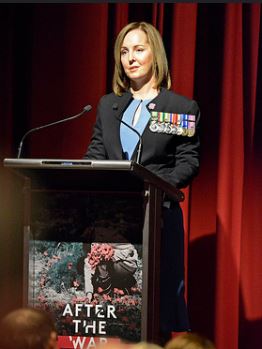
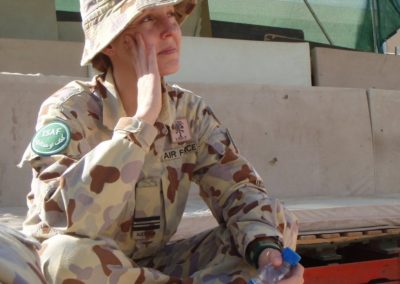
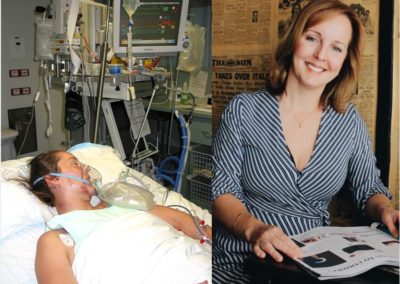

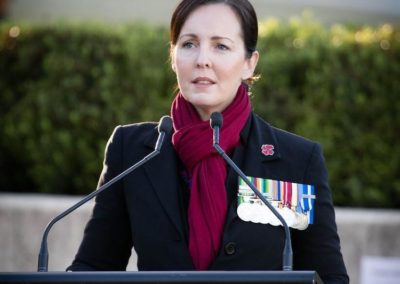




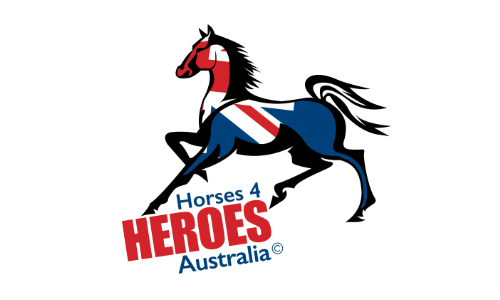
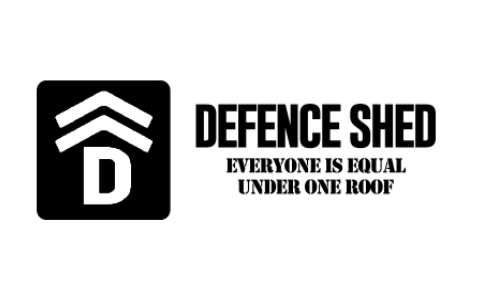
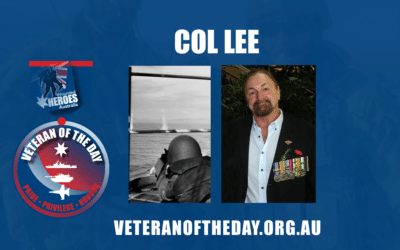
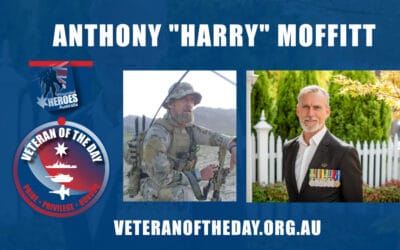
0 Comments